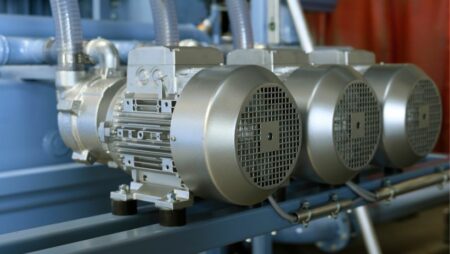产品说明
Lab Oilless 45L/M Electric Operated Diaphragm Vacuum Pump Manufacturer
Applications:
MP series disphragm vacuum pump provides negative pressure condition for processes of evaporation, distillation, crystallization, drying, sublimation, reduces pressure filtration etc. It can be used to extract a variety of highly toxic, flammable and explosive, strong acid, and alkali sample.
Advantages:
- A substitute for water circulating vacuum pump and rotary vane vacuum pump.
- No need of any working medium. No friction between working parts.
- Vacuum level can be adjusted according to experiment requirements.
- All parts that contacting gases are made of PTFE+FV rubber with chemical resistance.
- Valve plate adopts imported materials.
- Motor is supplied by famous manufacturer.
- With reasonable design, transmission runs smoothly.
- With small volume and light weight, easy to move. Saving space.
| 模型 | MP-401 |
| 电源 | 250W |
| Electrical Requirements | 1Phase, 220V/50Hz |
| Rotation Speed | 1400 rpm |
| Inlet Diameter | Φ10 mm |
| Outlet Diameter | Φ10 mm |
| Ultimate Vacuum | 0.095 Mpa |
| Pumping Speed | 45 L/min |
| Safety | Check Valve |
| Shipping Dimensions (L×W×H)(mm) |
540×340×500 |
| Gross Weight | 33 KG |
Our Service
| 售后服务: | 24 Hours Online |
|---|---|
| 保修: | One Year |
| Oil or Not: | Oil Free |
| 结构 | Diaphragm Vacuum Pump |
| Exhauster Method: | Positive Displacement Pump |
| 真空度 | High Vacuum |
| 定制: |
可用
|
|
|---|

What Are the Advantages of Using Oil-Sealed Vacuum Pumps?
Oil-sealed vacuum pumps offer several advantages in various applications. Here’s a detailed explanation:
1. High Vacuum Performance: Oil-sealed vacuum pumps are known for their ability to achieve high levels of vacuum. They can create and maintain deep vacuum levels, making them suitable for applications that require a low-pressure environment. The use of oil as a sealing and lubricating medium helps in achieving efficient vacuum performance.
2. Wide Operating Range: Oil-sealed vacuum pumps have a wide operating range, allowing them to handle a broad spectrum of vacuum levels. They can operate effectively in both low-pressure and high-vacuum conditions, making them versatile for different applications across various industries.
3. Efficient and Reliable Operation: These pumps are known for their reliability and consistent performance. The oil-sealed design provides effective sealing, preventing air leakage and maintaining a stable vacuum level. They are designed to operate continuously for extended periods without significant performance degradation, making them suitable for continuous industrial processes.
4. Contamination Handling: Oil-sealed vacuum pumps are effective in handling certain types of contaminants that may be present in the process gases or air being evacuated. The oil acts as a barrier, trapping and absorbing certain particulates, moisture, and chemical vapors, preventing them from reaching the pump mechanism. This helps protect the pump internals from potential damage and contributes to the longevity of the pump.
5. Thermal Stability: The presence of oil in these pumps helps in dissipating heat generated during operation, contributing to their thermal stability. The oil absorbs and carries away heat, preventing excessive temperature rise within the pump. This thermal stability allows for consistent performance even during prolonged operation and helps protect the pump from overheating.
6. Noise Reduction: Oil-sealed vacuum pumps generally operate at lower noise levels compared to other types of vacuum pumps. The oil acts as a noise-damping medium, reducing the noise generated by the moving parts and the interaction of gases within the pump. This makes them suitable for applications where noise reduction is desired, such as laboratory environments or noise-sensitive industrial settings.
7. Versatility: Oil-sealed vacuum pumps are versatile and can handle a wide range of gases and vapors. They can effectively handle both condensable and non-condensable gases, making them suitable for diverse applications in industries such as chemical processing, pharmaceuticals, food processing, and research laboratories.
8. Cost-Effective: Oil-sealed vacuum pumps are often considered cost-effective options for many applications. They generally have a lower initial cost compared to some other types of high-vacuum pumps. Additionally, the maintenance and operating costs are relatively lower, making them an economical choice for industries that require reliable vacuum performance.
9. Simplicity and Ease of Maintenance: Oil-sealed vacuum pumps are relatively simple in design and easy to maintain. Routine maintenance typically involves monitoring oil levels, changing the oil periodically, and inspecting and replacing worn-out parts as necessary. The simplicity of maintenance procedures contributes to the overall cost-effectiveness and ease of operation.
10. Compatibility with Other Equipment: Oil-sealed vacuum pumps are compatible with various process equipment and systems. They can be easily integrated into existing setups or used in conjunction with other vacuum-related equipment, such as vacuum chambers, distillation systems, or industrial process equipment.
These advantages make oil-sealed vacuum pumps a popular choice in many industries where reliable, high-performance vacuum systems are required. However, it’s important to consider specific application requirements and consult with experts to determine the most suitable type of vacuum pump for a particular use case.

真空泵能否用于太阳能电池板的生产?
是的,真空泵广泛用于太阳能电池板的生产。下面是详细说明:
太阳能电池板又称光伏(PV)板,是一种将太阳光转化为电能的装置。太阳能电池板的制造过程涉及多个关键步骤,其中许多步骤都需要使用真空泵。真空技术在确保太阳能电池板生产的效率、可靠性和质量方面发挥着至关重要的作用。以下是使用真空泵的一些关键领域:
1.硅锭生产:太阳能电池板制造的第一步是生产硅锭。这些硅锭是纯晶体硅的圆柱块,是太阳能电池的原材料。真空泵用于 Czochralski 工艺,该工艺包括在石英坩埚中熔化多晶硅,然后从熔化的硅中缓慢拉出单晶硅锭。在晶体生长过程中,真空泵通过去除杂质和防止污染来创造受控环境。
2.晶片化:硅锭生产出来后,要进行晶圆切割,将硅锭切成薄晶圆。线锯中使用真空泵来创造低压环境,帮助冷却和润滑切割线。真空还有助于清除切片过程中产生的硅碎片,确保切割干净、精确。
3.太阳能电池生产:真空泵在太阳能电池生产的各个阶段都发挥着重要作用。太阳能电池是太阳能电池板中将太阳光转化为电能的独立单元。真空泵用于以下过程:
- 扩散:在扩散过程中,将磷或硼等掺杂剂引入硅晶片,以产生所需的电气特性。扩散炉中使用真空泵为扩散过程创造受控气氛,并清除可能影响太阳能电池质量的任何杂质或气体。
- 沉积:在硅晶片上沉积抗反射涂层、钝化层和电极材料等薄膜。真空泵用于各种沉积技术,如物理气相沉积(PVD)或化学气相沉积(CVD),为精确、均匀的薄膜沉积创造必要的真空条件。
- 蚀刻:蚀刻工艺用于在太阳能电池上形成所需的表面纹理,从而增强光捕获并提高效率。真空泵用于等离子蚀刻或湿蚀刻技术,以去除不需要的材料或在太阳能电池上形成特定的表面结构。
4.封装:太阳能电池生产出来后,要对其进行封装,使其免受潮湿和机械应力等环境因素的影响。封装过程中使用真空泵来创造真空环境,确保从封装材料中排除空气和水分。这有助于实现适当的粘合,防止形成气泡或空隙,从而降低太阳能电池板的性能和使用寿命。
5.测试和质量控制:真空泵还可用于太阳能电池板生产过程中的测试和质量控制。例如,真空系统可用于泄漏测试,以确保封装的完整性,并检测电池板组件中任何潜在的缺陷或泄漏。真空测量技术还可用于评估太阳能电池或电池板的电气特性和效率。
总之,真空泵是太阳能电池板生产中不可或缺的设备。真空泵用于制造过程的各个阶段,包括硅锭生产、晶片、太阳能电池生产(扩散、沉积和蚀刻)、封装和测试。真空技术可实现精确控制、防止污染和高效加工,有助于生产出优质可靠的太阳能电池板。
暖通空调系统中真空泵的用途是什么?
在暖通空调(HVAC)系统中,真空泵起着至关重要的作用。下面是详细说明:
暖通空调系统中真空泵的作用是去除制冷剂管路和系统本身中的空气和湿气。暖通空调系统,尤其是依靠制冷的系统,需要在特定的压力和温度条件下运行,以促进热量的传递。为确保最佳性能和效率,必须从系统中排出任何不可冷凝的气体、空气和湿气。
以下是暖通空调系统中使用真空泵的主要原因:
1.除湿:由于系统安装、泄漏或维护不当等各种因素,暖通空调系统中可能存在湿气。当湿气与制冷剂结合时,会导致结冰、系统效率降低以及系统部件的潜在损坏等问题。真空泵通过创造低压环境来帮助去除湿气,从而使湿气沸腾并变成蒸汽,有效地将其从系统中抽空。
2.消除空气和不凝性气体:空气和不凝性气体(如氮气或氧气)可能在安装、维修过程中或通过泄漏进入暖通空调系统。这些气体会阻碍制冷过程、影响传热并降低系统性能。通过使用真空泵,技术人员可以排空空气和不凝性气体,确保系统在设计的制冷剂和压力水平下运行。
3.准备制冷剂充注:在向暖通空调系统充注制冷剂之前,关键是要抽真空,以清除任何杂质,确保系统清洁,为制冷剂的最佳循环做好准备。通过使用真空泵对系统进行抽真空,技术人员可确保制冷剂进入清洁可控的环境,从而降低系统故障的风险并提高整体效率。
4.泄漏检测:真空泵也用于暖通空调系统的泄漏检测。抽空系统后,技术人员可以监测压力是否保持稳定。如果压力明显下降,则表明存在泄漏,技术人员可在向系统注入制冷剂之前查明并修复泄漏。
总之,真空泵在暖通空调系统中起着至关重要的作用,它可以去除湿气、排除空气和不凝性气体、为制冷剂充注做好准备并帮助检测泄漏。这些功能有助于确保最佳的系统性能、能效和使用寿命,同时还能降低系统故障和损坏的风险。


editor by CX 2023-11-27